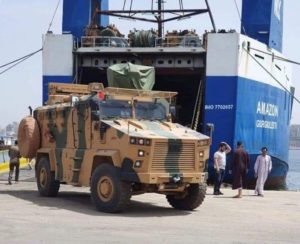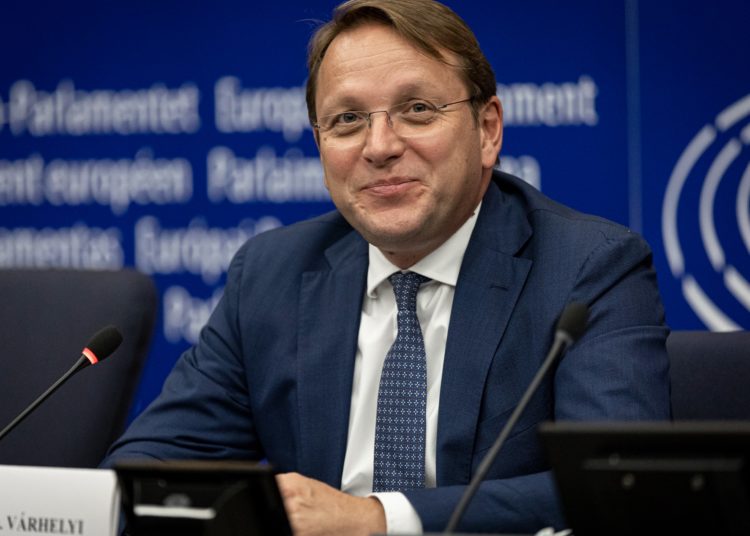Abdullah Bozkurt/Stockholm
In a new report issued by the European Commission, Turkey was criticized for foreign and security policy choices that often contradicted those of the 27 member states of the European Union, while the government of President Recep Tayyip Erdoğan was called to task for deploying Syrian fighters in Libya and rebels in Syria in coordination with the Turkish army.
“There was backsliding in the framework of political dialogue on Common Foreign and Security Policy (CFSP) as Turkey’s increasingly assertive foreign policy continued to collide with the EU priorities under CFSP, notably due to its support for military actions in the Caucasus, Syria and Iraq,” said the report, which was released on October 19, 2021.
“Turkey in particular never aligns with EU restrictive measures, including that of economic sanctions,” the commission stated.
Turkey’s military involvement in Libya, especially sending Syrian fighters there, seriously hampered the implementation of the UN-led Berlin process. “Turkey claimed that the UN embargo provisions, the articles on withdrawal of foreign elements and the suspension of military training in the cease-fire agreement are not applicable to the legitimate government,” the report stated, stressing that “the presence of mercenary forces was a complicating factor.”
The EU also found that Turkey’s position on Operation IRINI was not justified. The EU’s Operation IRINI is tasked with enforcing a UN arms embargo on Libya in high waters under UNSC resolutions adopted in 2016 and 2020 and has been operative since March 31, 2020. Turkey claimed Operation IRINI was not balanced and that it disproportionally targeted the Turkish-backed Government of National Accord (GNA).
The divergence over IRINI led to increased tension between Turkey and the EU and to maritime incidents as EU member states tried to enforce the UN arms embargo on Libya. As part of the IRINI operation, a German naval vessel intercepted the Turkish-flagged cargo ship M/V Roseline A in the Mediterranean, roughly 200 kilometers off the coast of Libya, on November 22, 2020 on suspicion that the vessel was carrying illegal arms. The interception sparked a strong reaction from the Erdoğan government, which claimed that the EU had no authority to inspect Turkish ships.
Part of the European Commission report that lambasted Turkey on foreign and security policy:
Turkey maintained a very low alignment rate of around 14 percent with the EU stand on foreign and security policy, the report said. It noted that “Turkey’s military support in Libya, including the deployment of foreign fighters on the ground, and its persistent criticism of, and lack of cooperation with Operation IRINI, are detrimental to the EU’s effective contribution to the UN arms embargo implementation, and have led to conflicting approaches on Libya.”
The findings are the latest in a series of reports issued in recent years by international organizations that criticized Turkey for deploying foreign fighters in the territories of other countries and pursuing policies that threatened the peace and stability of Turkey’s neighborhood.
In September 2021 the Parliamentary Assembly of the Council of Europe (PACE), Europe’s largest intergovernmental body that promotes the rule of law, identified Turkey as a country that sent Syrian jihadists to help Azerbaijan in its conflict last year with neighboring Armenia.
In a resolution that was approved after a heated debate on September 27, 2021, PACE noted that “there is worrying evidence of the use by Azerbaijan, with Turkey’s assistance, of Syrian mercenaries …” It urged Turkey to cooperate fully with the European Court of Human Rights (ECtHR) on complaints lodged against Turkey over this action.
In November 2020 the UN Working Group on the use of mercenaries also pointed to Turkey for deploying Syrian fighters in Armenia and other places. Chris Kwaja, who chairs the Working Group, said, “The alleged role of Turkey is all the more concerning given the similar allegations addressed earlier this year by the Working Group in relation its role in recruiting, deploying and financing such fighters to take part in the conflict in Libya.”

UN rapporteurs had sent a joint letter to the Turkish government seeking further information on its role and “the circumstances surrounding the recruitment, financing, transportation and deployment of Syrian fighters to participate in the hostilities in the Nagorno-Karabakh conflict.”
They noted that the alleged use of Syrian fighters by Turkey in hostilities in third states negatively impacts peace and security in the region. “The systematic and continuous recruitment of these fighters for financial compensation is particularly worrisome,” the letter said.
The Turkish government’s response to the UN letter was conveyed by the country’s permanent mission to the UN office in Geneva via a note verbale dated January 21, 2021. “The press release by the Working Group on the use of mercenaries based on black propaganda products of fake images and fabricated news has undermined the credibility of the UN Special Procedures Mechanism,” the Turkish government stated.

In June 2020 the UN sent a letter to the Turkish government revealing how Turkey effectively recruited Syrian fighters from several Syrian armed groups to take part in military operations in Tripoli in support of the GNA.
In that communication SADAT and other possible Turkish contractors were also accused by UN agencies of recruiting children under 18 years of age to take part in the armed conflict in Libya. “Not only have these [Turkish] companies facilitated the recruitment and deployment of mercenaries from Syria to Libya, but, according to the available information, they have also contributed to the recruitment of children under 18 years of age to take part in an armed conflict,” the letter said.
“Turkish authorities allegedly contracted private military and security companies to facilitate the selection as well as the preparation of official and contractual documentation for the fighters, apparently in coordination with the Turkish security services. One of the companies cited in this context was the SADAT International Defence Consultancy, the letter stated.
SADAT, which is fully funded and supported by the Turkish government, is owned by retired Gen. Gen. Adnan Tanrıverdi, the former chief military aide to President Erdoğan. Nordic Monitor has published several reports on SADAT’s activities and goals in Turkey and abroad.
Tanrıverdi announced in December 2019 that SADAT had been working to pave the way for the long-awaited mahdi (prophesied redeemer of Islam), for whom the entire Muslim world is waiting.
Opposition Turkish lawmakers had asked the government about the alleged role of SADAT in training Islamic State in Iraq and Syria (ISIS) and Syrian al-Qaeda group Jabhat al-Nusrah (al-Nusrah Front) fighters and the alleged close relations between Turkish intelligence agency MİT and SADAT.
Full text of the European Commission 2021 Report on Turkey:












